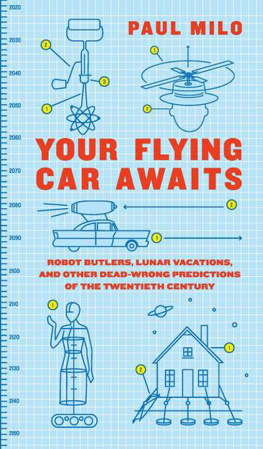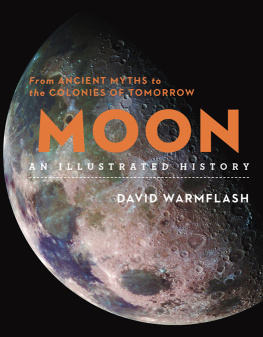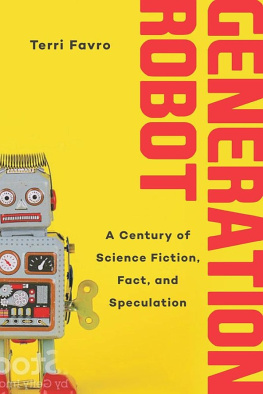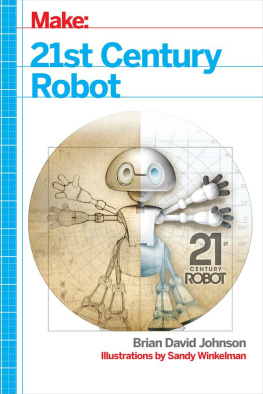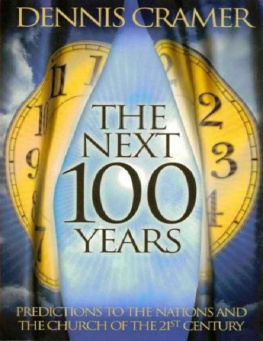In memory of my parents, Helen and Gabriel Milo
Whatever Happened to the Future?
A few years ago I came across an interesting article published in a London newspaper on New Years Eve, 1899. In the article, the author assumes the perspective of a journalist writing exactly one hundred years later, looking back on the major scientific developments of the 20th century. Although the details escape me now, I remember being generally impressed with the writers prescience. He wrote that in the previous ten decades the worlds population grew to about 7 billionnot that far off from the actual number. He wrote that life expectancy in Britain and the other technologically advanced countries had risen to about seventy, again, close to being right on the money and all the more remarkable because back then the average person lived only into their mid-forties. He also described something like radio and televisionnot bad at a time when the most advanced form of communication was the telegraph.
But the writer also had a few goofs. For instance, he believed that here in the 00s, wed still be making cross-country journeys in dirigible balloons. The British Empire would still be going strong. And there was no more war; he believed that something like a United Nations maintained something like a world police force that stepped in to stop armed conflicts before they started.
It was the authors misfires more than his spot-on guesses that struck a chord with me. When I was growing up in the 1970s, I can remember coming across the phrase by the twenty-first century quite a bit, as in, by the twenty-first century, well all live to be one hundred and thirty or by the twenty-first century, well have computers that think. I found myself conducting a little mental experimentif I were to travel back in time, say to my disco-era childhood, what would it be about the early 21st century that would most amaze people? What would it be about our own time that would seem the most future-y to people back then?
Im sure they would be bowled over by, say, the cell phone, or the Internet. But for some reason, the more I thought about it, the more I came to feel that people in the 1970s would generally be underwhelmed with the world I came from. This is partly the fault of pop culture. Like a lot of 70s babies, one of my favorite TV shows was The Six Million Dollar Man, which was about a guy named Steve Austin whos endowed with superpowers after government doctors replace some of his body parts with robotic components. I suppose that as I was watching the show, a seed was planted in my young, still formative mind, because as I sit and think about it today, I cant help but feel more than a tinge of disappointment that were nowhere near the future that the show envisioned.
Really, how come they cant give us bionic arms and legs, supervision and ultrasensitive hearing? Theres been a lot of progress in surgery and a lot of progress in robotics since then, so why is it that I still cant bench-press a small car or jump a fifteen-foot fence like Austin could? The sci-fi of the 50s, 60s and 70s left millions of us expecting things to get a lot stranger over the next three decades than they actually did.
Still, I wasnt really interested in doing a book about the future as viewed through the lens of science fiction, primarily because of that second word: fiction. The creators of The Six Million Dollar Man set out to entertain, not predict. My latent disappointment in not having a bionic bod cant be blamed on them. But as I started to look into the subject a little more, I discovered that there wasand isvirtually an entire industry dedicated to telling us what the future held (or holds) according to people who claim to be intelligent enough to actually know. Think tanks, commentators, magazines, and professional associations, all purporting to give us an actual glimpse into the crystal ball. Once I started looking, I discovered a lot of material produced by various experts throughout the 20th century who made serious attempts to describe what the world would be like, or was supposed to be like, right now.
What struck me about many of these prognostications was that even though they used methods a lot more sophisticated than those employed by the creators of 70s-era television shows, many of them have proved to be almost as outlandish. By now, for instance, a fair number of experts believed that our main source of food would be planktonthanks to what appeared to be looming food shortages. There were supposed to be moon bases today, too. And yes, of course, flying cars.
The more digging I did, the more I came across ideas and predictions that needed to be discussed. Many of these were ideas too amazing to leave between the dusty covers and professional journals of 20th century. The sheer wrongness of these guesses, I felt, made them too compelling to be forgotten. I wrote this book as a way to revisit those wacky, weird futures of the past.
The predictions in this book include many that were made by scientists and other experts with a cautious temperament, the kind of people who hedge their bets. For instance, the Hudson Institute, a think tank, produced an entire volume of forecasts in the mid-1960s that the authors, Herman Kahn and Anthony Wiener, carefully described as projections, things that could happen but wouldnt necessarily happen. As I was doing my research, I imagined Kahn, Wiener, and some of the other futurists confronting me, protesting that their forecasts were intended only as a guide, only one of a range of possible futures, as the writer Arthur C. Clarke, another one of my sources, once wrote in his own works of futurism.
While I can understand this argument, there are a few flaws with it. Many of the forecasts included here were the end result of extensive research by the forecasters making them. These werent merely off-the-cuff guesses, and in many cases they were intended to be used as a reference by governments, universities, and corporations planning for the unforeseen future. These are not people making guesses with a toy from a Cracker Jack box; these are serious minds who were trying to use their expertise to decipher what the world would look like. In other words, I took these forecasts as seriously as they were intended to be taken. In addition, Im pretty sure that the prognosticators well meet in this book would be more than happy to accept the credit for those forecasts that proved to be absolutely correct (and theres a section in this book listing some of their right-on-the-money guesses). If you aspire to guru status, you have to be as willing to accept a little mild ribbing for your mistakes as well as the accolades for your successes.
This book was a lot of fun to write. I loved the sheer zaniness of some of the predictions (like the guy in the 1940s who was sure we would all own personal helicopters by now), and the piquancy of others (like those who thought that in the 21st century we would no longer be fighting wars). I learned that predictions can say as much about the present as they do about the future (when times were good, as in the 1950s, optimism prevailed; in the 70s there was a lot more doom and gloom). I also learned that when trying to figure out whats coming next, its generally better to err on the side of the gradualespecially when youre only looking ahead one generation (it takes time for truly sweeping changes to take root). I also learned that one of the worst mistakes any of us can make when trying to guess the future is to take a present-day trend and merely assume that it will continue.
Finally, I was reminded yet again that life is full of wild cards, that all kinds of things can happen that are simply unforeseeable. If nothing else, I hope readers of this book are reminded that trying to figure out whats around the bend ahead will always be an inexact science.
Next page
